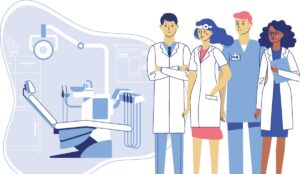Your First Year as an Associate Dentist: What to Expect and How to Thrive
Starting your dental career can be both thrilling and nerve-wracking. What to Expect in Your First Year as an Associate Dentist is more than just a question—it’s a mindset shift from student to practitioner. As you transition from dental school to a real-world clinical setting, you’ll encounter new responsibilities, patient dynamics, and professional growth opportunities.
Whether you’re joining a private clinic or a corporate practice, knowing what lies ahead can ease the anxiety and empower your journey.
Starting Your Dental Career: Key Shifts from School to Practice
There are huge differences in your first year as an associate dentist compared to what you have become accustomed to in dental school. The controlled, supervised setting of school changes to the more fast-paced and independent environment of practice.
You’ll notice that:
- There, efficiency and speed are even more important than they are in school.
- There’s not as much hand-holding, a lot more ownership.
- Your ability to communicate is as important as your clinical ability.
- Real patients have their preferences, budgets, and personalities.
Navigating Clinical Challenges with Confidence
It’s completely normal to feel overwhelmed for a while. The year as an associate dentist is one filled with lessons.
Some examples of clinical problems include the following:
- Making the diagnosis without a second opinion.
- Managing complex cases.
- Balancing quality with speed.
The best strategy?
Keep asking questions. And find a mentor, look at case studies, and take CE (continuing education) classes. You’ll make mistakes along the way, but it’s how you approach those mistakes that will determine your development.
The Business Side of Dentistry
Most likely, you became a dentist to see patients, but business matters as well. Physical reality is a concept many young dentists are shocked by after taking over that operations are an extension of revenue, and vice versa.
Your first year, you’ll learn:
- Insurance-compliant treatment planning.
- Systems for retaining and suggesting patients.
- Scheduling and time management standards.
- Productivity goals and daily targets.
Learning how you contribute makes you an asset to the team, plus a future potential partner.
Building Patient Trust: Communication Is Key
It’s not a tech skill that builds a strong patient base. The way you can connect, teach, and bring solace will be what separates you.
Here are ways to establish early patient trust:
- Welcome each patient by name.
- Provide clear explanations of procedures without using jargon.
- Therapeutic value should be made available to patients.
- If you’re uncertain, be honest about it and offer to refer the matter to a senior colleague.
The first year of being an associate dentist is when you shine your chairside manner and create lifelong relationships.
Finding the Right Mentorship
Mentorship can fast-track your learning curve in a way school never could. An older dentist in your practice may provide wisdom about clinical decisions, patient management, or even career choices.
What to look for in a mentor:
- The degree of access to a willingness to respond to interrogatories.
- Positive reinforcement rather than criticism.
- A wish for you to blossom, not to produce.
Managing Burnout and Maintaining Work-Life Balance
Lots of new dentists experience burnout in their first few years because they’re over-scheduled, suffering from imposter syndrome, or pressured to reach production goals.
Here’s what you need to avoid burnout:
- Establish parameters for your working hours.
- Focus on mental health and the body being well.
- Honor the small wins—every day doesn’t have to be a perfect day.
- Guard your hobbies and downtime jealously.
Salary Expectations and Financial Planning
Your first associate dentist paycheck will depend on where you work, the type of practice, and how you are compensated (hourly vs. Percentage vs. salary).
Tips for financial stability:
- Know your compensation plan cold.
- Inquire about things like malpractice insurance, CE credits, or retirement plans.
- Make a budget that factors in student loans, rent, and savings.
- Year 1 financial wisdom is a gateway to lasting riches.
Conclusion – Expect in Your First Year as an Associate Dentist
Your first year as an associate dentist is a rollercoaster—exciting, exhausting, and ultimately rewarding. You’ll gain skills they never taught in school, form meaningful patient relationships, and lay the groundwork for a fulfilling career. Stay curious, ask for help, and celebrate every milestone, no matter how small.
Eager to start growing your dental career? Join our newsletter for more dentist career tips, expert guides, and other exclusive resources or browse through our blog posts to continue learning.
Frequently Asked Questions – First Year as an Associate Dentist
A: If you still have questions regarding what to expect in your first year as an associate dentist, the FAQs below can aid in clarification.
Q1. What if I make a mistake on a patient?
A: Mistakes happen. Confess, ask your senior dentist, and move on. It very much resonates with patients who appreciate honesty and professionalism.
Q2. How much should I earn in my first year?
A: Compensation is variable, but you should budget for $100,000 to $160,000 average (depending on where you live and whether you work in a primary care or surgical specialty practice).
Q3. Is it normal to work long hours in the beginning?
A: Yes, early-career associates do their fair share of evenings or weekends. This is something that comes with experience and is something you become more proficient with.
Q4. What skills should I focus on developing first?
A: Time management, treatment planning, and patient communication are key early skills that boost confidence and case acceptance.
Q5. How can I build strong relationships with patients as a new dentist?
A: Start by actively listening, clearly explaining treatments, and showing genuine empathy. These soft skills are essential for success in your first year as an associate dentist.
Q6. Should I expect mentorship in my first job?
A: Yes, many practices offer mentorship, especially if you’re starting your dental career. Having senior dentists guide you can make your transition smoother and improve your clinical decision-making.
Q7. What’s the biggest challenge in the first year as an associate dentist?
A: Balancing clinical speed with quality care is a common challenge. New dentists often struggle with time efficiency while trying to maintain excellent patient outcomes.
Q8. How do I handle patient complaints or dissatisfaction?
A: Stay calm, listen carefully, and address concerns with professionalism. Patient communication is one of the top skills to develop as a new dentist.





